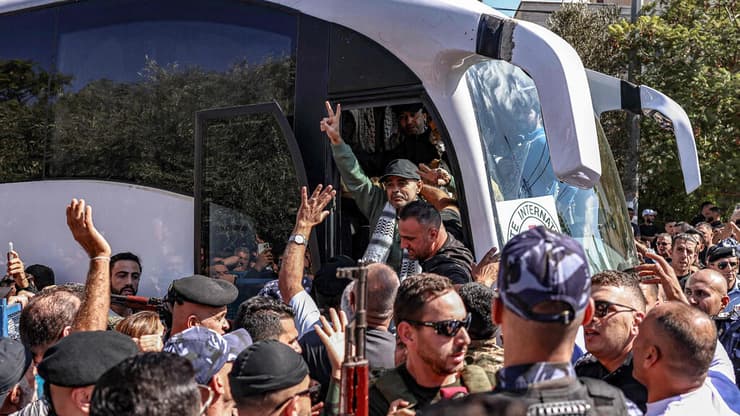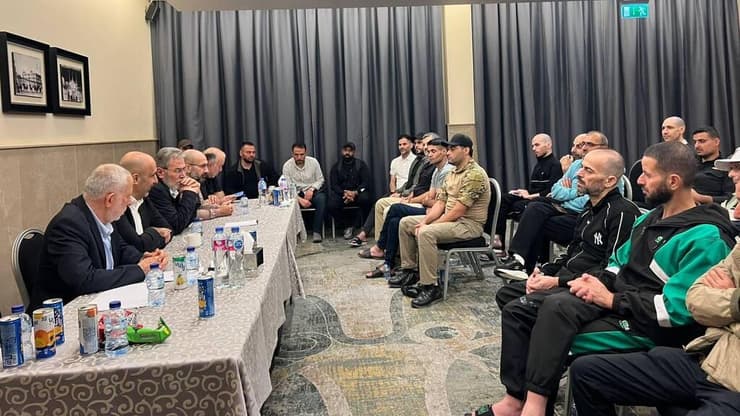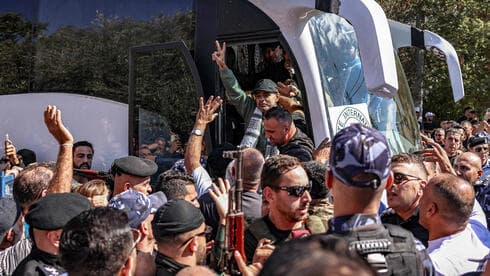In Egypt they are in a hotel under Egyptian supervision, in Israel they are being monitored by intelligence in real time: 154 of the high-profile prisoners who were defined as being removed were transferred via the Rafah crossing to Cairo, while about 70 others returned to their homes in Judea and Samaria. The security establishment is trying to prevent celebrations and deter them:"The terrorists understand that the situation has changed, but these are not Zionists."
Einav Halabi, Elisha Ben Kimon|
154 of the 250 Palestinian prisoners sentenced to life imprisonment or heavy sentences and released as part of the first phase of the hostage deal and the end of the war, were transferred via the Rafah crossing to Cairo, where they are staying under Egyptian supervision - in a move approved in coordination with Israeli security officials. These are the same prisoners who were defined as being removed, and have been undergoing medical examinations and humanitarian accompaniment in recent days under the supervision of representatives of the Red Cross. At the same time, Israel is closely monitoring the released prisoners who have returned to Judea and Samaria:"The terrorists understand that the situation has changed, but no one is deluding themselves - these are not Zionists."

Released prisoners welcomed at celebrations in Ramallah (Photo: Zain JAAFAR / AFP)
Palestinian officials estimate that some of the released prisoners will be accepted in Turkey, Qatar or other Arab countries, while others will remain in Egypt and rebuild their lives there. The 154 prisoners who were exiled to Egypt are currently staying in a hotel in Cairo under Egyptian supervision, and are undergoing initial medical examinations and humanitarian assistance under the supervision of representatives of the Red Cross.
Turkey and Qatar have expressed willingness to accept some of the released prisoners, but have not yet made any official announcements, and the applications for acceptance are still being reviewed by the foreign ministries of the receiving countries. However, the destination of each prisoner is predetermined by Israel and included in the release agreement, and the possibility of remaining in Cairo is subject to approval by the Egyptian authorities.
The Palestinian Prisoners Club estimates that many of the deportees will gradually integrate into life in Cairo, marry and remain in the country, as happened in previous deals. Among the current freed people are also four Jordanian citizens - two of whom were transferred to Egypt and two to Judea and Samaria.
 The meeting in Cairo between the prisoners and representatives of the terrorist organizations
The meeting in Cairo between the prisoners and representatives of the terrorist organizationsAccording to estimates by the Palestinian Prisoners Authority, some of the deportees may leave Cairo for other countries - including Tunisia, Algeria and Pakistan - but so far no official statements have been made on the subject. In the deal last January, some of the prisoners asked to remain in Gaza but were refused, because they were residents of Judea and Samaria who were exiled from there by an Israeli decision.
Ahead of the diplomatic talks, the Islamic Jihad leadership, led by Ziad Nahala, along with representatives from Hamas, held meetings in Cairo with the released prisoners and representatives of the Palestinian factions. Nahala congratulated the prisoners for their"firm stand throughout the years of imprisonment," and thanked Egypt and Qatar for mediating and promoting the deal. Islamic Jihad claims that there is close cooperation between Cairo, Qatar, and the Palestinian factions to advance further stages of the deal.
Continuing attempts to maintain stability on the ground, the security establishment is currently focusing mainly on Judea and Samaria: 48 hours after the liberation, about 70 of the 80 terrorists who were released in Judea and Samaria returned home, while the rest are hospitalized and have not yet returned home. Since the release of dozens of terrorists in recent days, there have been no open joyous processions, shooting in the air, or calls of incitement; IDF and Shin Bet forces are deployed near the homes of the freed, and surveillance equipment and drones accompany every movement."We are trying to do everything to get the message across; we will not tolerate expressions of joy. If there are any, we will disperse them," said a security source.
The pressure deployment and patrols inside the villages are intended to curb celebrations and reduce the ability of terrorist organizations to mobilize the area; Central Command emphasizes that they aim to maintain a new deterrent, and expects the coming weeks to be particularly sensitive."The terrorists understand that the situation has changed, it's not what they expected or recognized," added a senior security source,"but no one is deluding themselves, these are people involved in terrorism and not Zionists."
Alongside operational preparedness, the IDF continues to conduct real-time intelligence gathering and sensitive conversations with the families of the released, in order to preemptively reduce events that could develop into conflicts. Close monitoring of the homes of the released and their families is expected to continue in the near future, and in certain areas the military presence will be increased.
The IDF mentions Operation Iron Wall in northern Samaria, where a military presence remains in the Jenin, Tulkarm and Nur a-Shams refugee camps, and that it is still unclear how long the deployment will continue. The IDF is formulating guidelines for rehabilitation and reconstruction in the area, but emphasizes that anything that could harm freedom of action will not be allowed. Security sources explain that this is a comprehensive effort to stabilize the area, after a series of deadly attacks that occurred last month at the Git Junction, the Bel checkpoint and the Ramot neighborhood in Jerusalem.
No comments have been published for this article, be the first to comment

